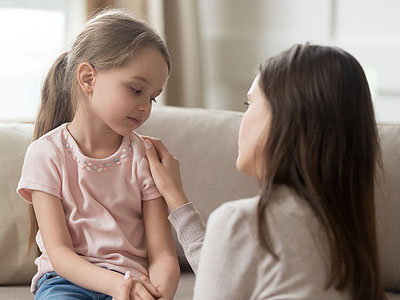-
Why Mental Health Should be a Normal Topic of Conversation with Children
- Posted on March 31, 2021
- by admin
- in All Articles, Mental Health, NFSB Blog
- Comments Off on Why Mental Health Should be a Normal Topic of Conversation with Children
 In the previous article, we discussed the signs of loneliness and isolation in children and what you can do to help. As parents, it can be difficult to know what to say to children when they’re visibly sad, depressed, angry, or lonely. What’s the right time? What’s the right setting? What’s the right approach?
In the previous article, we discussed the signs of loneliness and isolation in children and what you can do to help. As parents, it can be difficult to know what to say to children when they’re visibly sad, depressed, angry, or lonely. What’s the right time? What’s the right setting? What’s the right approach?The best thing parents or caregivers can do is normalize conversations about feelings and emotions. Instead of stressing about whether you’re doing it right, start having open discussions with your child about their feelings as early as possible.
“The best time to have conversations about mental health is now or yesterday,” said Jessica Hauck, LAC, ATR-P, a mental health counselor at Nutley Family Service Bureau (NFSB). “It’s never too early to create an environment where children, adolescents, and teenagers feel comfortable talking about how they’re feeling.”
A great way to create such an environment is for parents to openly discuss their feelings with children and other adults in their life. Many parents will ask children how they’re feeling, but parents won’t share their own feelings.
If a child shouldn’t be exposed to something that a parent is experiencing because the issue is very serious or inappropriate for a child, those feelings are best expressed to another adult or a therapist. In most cases, however, parents sharing their own feelings is an excellent start to a mental health conversation with a child.
For example, a parent might say, “I’ve been feeling a little down lately. This has been a rough week between work and weather. How are you feeling?”
“During the past year, so many people have been coping with loss on different levels,” Jessica said. “When adults in the family model these types of interactions and own the fact that they also struggle with mental health at times, this helps create an environment where it’s okay for kids to have these conversations, too.”
Giving children positive reinforcement every time you see them take their mental health seriously and express their emotions appropriately is another way to encourage children to discuss mental health.
For example, Jessica was seeing an adolescent girl who we’ll call Jamie. Jamie was struggling with behavioral issues that seemed to be coming from a place of anger, but anger wasn’t the source of the problem. She was lonely, sad, and struggling with self-confidence. She had also experienced a loss in her family.
One day, in the middle of a fight with her mother, Jamie just broke down and said, “I’m sorry. I’m not angry. I’m sad. It just keeps coming out like that.”
Jamie’s mother praised her for expressing how she was really feeling. They had open conversations about their emotions and the underlying causes, and they planned fun activities together. Jessica then helped Jamie and her mother process those feelings during counseling.
“Asking a child how they feel, and the child asking for help, should be normal interactions,” Jessica said. “Even when nothing is wrong, a little mental health check can normalize those conversations so they don’t feel awkward when there’s a problem.”
Understanding you need help and seeking that help through therapy are signs of strength, not weakness or shame. We’ve worked with many children at NFSB who don’t find out their parents are in therapy until the kids start their own therapy.
The child might say something like, “This isn’t fair! Nobody else is in therapy.” The child is then surprised but reassured to learn that their parent has been in therapy for years.
The more children talk about their feelings, and the earlier mental health conversations happen, the more aware children become of their feelings. They learn where those feelings come from, and they become more confident about expressing what they feel and why.
At the end of the day, the best thing you can do for your child’s mental health is create an environment in which conversations about mental health are normal, open, encouraged, and comfortable. If you or your child needs help working through a mental health issue, please contact NFSB to schedule an appointment for anyone or everyone in your family.
If you or your child needs help working through a mental health issue, please contact NFSB to schedule an appointment for anyone or everyone in your family.
If you enjoyed this article please consider sharing it!

















